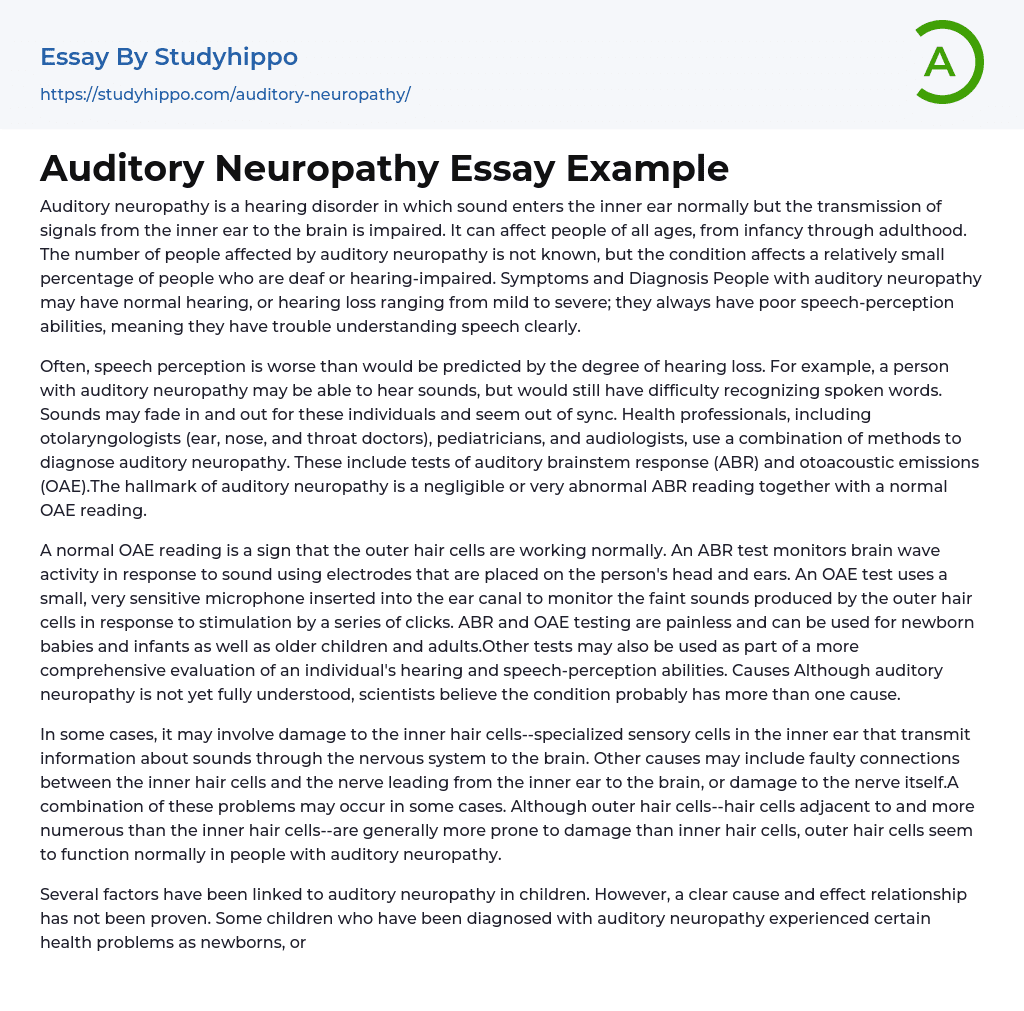Auditory neuropathy, which affects individuals of all ages, is a hearing condition where sound enters the inner ear but signal transmission to the brain is hindered. This causes mild to severe hearing loss or weak speech-perception abilities, resulting in difficulties comprehending speech. It impacts a small percentage of deaf or hard-of-hearing individuals and there is no specific data on those affected.
Individuals with auditory neuropathy struggle to understand spoken words despite having the ability to hear sounds. They exhibit lower speech perception than what is expected, considering their level of hearing loss. The condition's signs include inconsistent sound quality and timing problems. Various health professionals, such as otolaryngologists, pediatricians, and audiologists, utilize different techniques like the auditory brainstem response (ABR) and otoacoustic emissions (OAE) tests to identify auditory neurop
...athy. An atypical ABR reading coupled with a typical OAE reading is a standard indicator of this ailment.
The ABR test and the OAE test are employed to evaluate hearing. The former uses electrodes on the head and ears to track brain wave activity in response to sound. It is utilized to detect a normal OAE reading, indicating that the outer hair cells are functioning correctly. Conversely, an OAE test employs a sensitive microphone placed inside the ear canal to capture faint sounds produced by outer hair cells following clicks. Both tests are painless and suitable for individuals of all ages, from newborns to adults. Further evaluations may be done for a comprehensive assessment of one's hearing and speech perception abilities. The specific causes of auditory neuropathy remain unclear; however, scientists believe there could be various contributing factors.
Auditory neuropathy can occur due to damage or faulty connections
in the inner ear's hair cells responsible for transmitting sound to the brain, as well as nerve damage. These issues may happen individually or simultaneously. It is important to note that although outer hair cells are more prone to damage than inner hair cells, they usually work correctly in people with auditory neuropathy.
While a definite cause-and-effect link has not been determined, different factors have been connected to auditory neuropathy in children. Some children with this condition encountered health issues before or during birth such as low birth weight, premature delivery, insufficient oxygen supply, and jaundice. Additionally, specific drugs given to address medical complications during pregnancy or after birth may harm the inner ear hair cells and result in auditory neuropathy.
Hereditary factors may contribute to certain instances of auditory neuropathy which can be heritable. Additionally, individuals with this condition might experience neurological disorders that impact other areas besides hearing, such as Friedreich's ataxia and Charcot-Marie-Tooth syndrome. Presently, there is no concrete solution for auditory neuropathy and the effectiveness of tools like hearing aids and cochlear implants varies according to expert opinions.
Experts recommend hearing aids and personal listening devices such as frequency modulation (FM) systems as beneficial for individuals with auditory neuropathy. Cochlear implants may also be useful for those with damaged or non-functioning inner ear parts, but there are currently no tests available to determine suitability for these devices. The most effective ways to educate and develop communication skills in children with hearing impairments are still under debate. However, professionals suggest that parents work with a team who considers each child's individual situation, options, family members, and caregivers.
It is widely believed that frequent interaction with infants
who have auditory neuropathy, through holding, facing, smiling and responding to them, is crucial for parents and caregivers. There are two main methods for teaching communication skills to infants and children who experience this condition. The first method suggests using sign language as their primary language at the beginning while the second approach advocates for a combination of listening skills, spoken English and technological aids such as cochlear implants and hearing aids.
The National Institute on Deafness and Other Communication Disorders in the USA suggests that both methods can be effective. Health professionals believe that relying only on spoken language may pose challenges for children with auditory neuropathy, who have difficulty understanding speech. Speechreading (or lip reading) may be beneficial for older children and adults who already know how to speak.
- Pregnancy essays
- Death essays
- Asthma essays
- Chronic Pain essays
- Diabetes essays
- Infection essays
- Infertility essays
- Pain essays
- Sexually Transmitted Disease essays
- Cholesterol essays
- Epidemic essays
- Pathogen essays
- Symptom essays
- Water supply essays
- Myocardial Infarction essays
- Chronic essays
- Hypertension essays
- Black Death essays
- Breast Cancer essays
- Down Syndrome essays
- Apoptosis essays
- Tuskegee Syphilis Experiment essays
- Type 2 Diabetes essays
- Central Nervous System essays
- Sleep essays
- Traumatic Brain Injury essays
- Epilepsy essays
- autism essays
- Alzheimer's Disease essays
- Sleep Deprivation essays
- Addiction essays
- Anatomy and Physiology essays
- Biodegradation essays
- Cancer essays
- Dental Care essays
- Disability essays
- Disease essays
- Disorders essays
- Health Care essays
- Infectious Disease essays
- Inquiry essays
- Intelligence Quotient essays
- Lung Cancer essays
- Medicine essays
- Neurology essays
- Nutrition essays
- Olfaction essays
- Physical Exercise essays
- Public Health essays
- Sex essays




